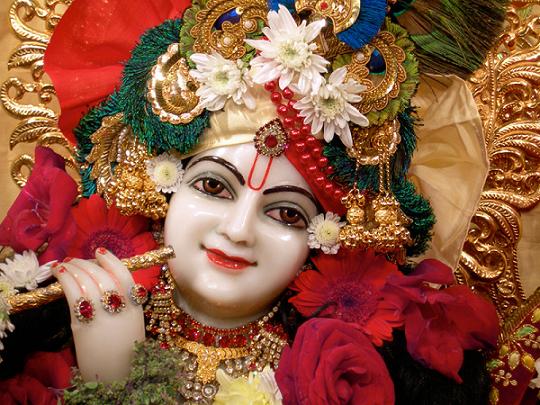arjuna uvaca
param brahma param dhama
pavitram paramam bhavan
purusam sasvatam divyam
adi-devam ajam vibhum
ahus tvam rsayah sarve
devarsir naradas tatha
asito devalo vyasah
svayam caiva bravisi me
TRANSLATION
Arjuna said: You are the Supreme Brahman, the ultimate, the supreme abode and purifier, the Absolute Truth and the eternal divine person. You are the primal God, transcendental and original, and You are the unborn and all-pervading beauty. All the great sages such as Narada, Asita, Devala, and Vyasa proclaim this of You, and now You Yourself are declaring it to me.
PURPORT
In these two verses the Supreme Lord gives a chance to the modern philosopher, for here it is clear that the Supreme is different from the individual soul. Arjuna, after hearing the essential four verses of Bhagavad-gita in this chapter, became completely free from all doubts and accepted Krishna as the Supreme Personality of Godhead. He at once boldly declares, "You are Parambrahma, the Supreme Personality of Godhead." And previously Krishna states that He is the originator of everything and everyone. Every demigod and every human being is dependent on Him. Men and demigods, out of ignorance, think that they are absolute and independent of the Supreme Lord Krishna. That ignorance is removed perfectly by the discharge of devotional service. This is already explained in the previous verse by the Lord. Now by His grace, Arjuna is accepting Him as the Supreme Truth, in concordance with the Vedic injunction. It is not because Krishna is an intimate friend of Arjuna that he is flattering Him by calling Him the Supreme Personality of Godhead, the Absolute Truth. Whatever Arjuna says in these two verses is confirmed by Vedic truth. Vedic injunctions affirm that only one who takes to devotional service to the Supreme Lord can understand Him, whereas others cannot. Each and every word of this verse spoken by Arjuna is confirmed by Vedic injunction.
In the Kena Upanisad it is stated that the Supreme Brahman is the rest for everything, and Krishna has already explained that everything is resting on Him. The Mundaka Upanisad confirms that the Supreme Lord, in whom everything is resting, can be realized only by those who engage constantly in thinking of Him. This constant thinking of Krishna is smaranam, one of the methods of devotional service. It is only by devotional service to Krishna that one can understand his position and get rid of this material body.
In the Vedas the Supreme Lord is accepted as the purest of the pure. One who understands that Krishna is the purest of the pure can become purified from all sinful activities. One cannot be disinfected from sinful activities unless he surrenders unto the Supreme Lord. Arjuna's acceptance of Krishna as the supreme pure complies with the injunctions of Vedic literature. This is also confirmed by great personalities, of whom Narada is the chief.
Krishna is the Supreme Personality of Godhead, and one should always meditate upon Him and enjoy one's transcendental relationship with Him. He is the supreme existence. He is free from bodily needs, birth and death. Not only does Arjuna confirm this, but all the Vedic literatures, the Puranas and histories. In all Vedic literatures Krishna is thus described, and the Supreme Lord Himself also says in the Fourth Chapter, "Although I am unborn, I appear on this earth to establish religious principles." He is the supreme origin; He has no cause, for He is the cause of all causes, and everything is emanating from Him. This perfect knowledge can be had by the grace of the Supreme Lord.
Here Arjuna expresses himself through the grace of Krishna. If we want to understand Bhagavad-gita, we should accept the statements in these two verses. This is called the parampara system, acceptance of the disciplic succession. Unless one is in the disciplic succession, he cannot understand Bhagavad-gita. It is not possible by so-called academic education. Unfortunately those proud of their academic education, despite so much evidence in Vedic literatures, stick to their obstinate conviction that Krishna is an ordinary person.
(Bhagavad-gita As It Is 10.12-13, Purport)
.

